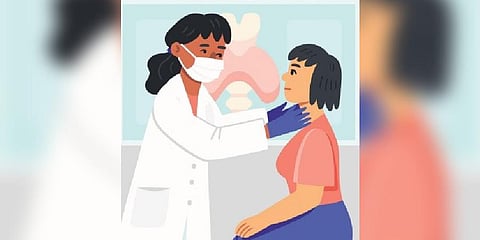

CHENNAI : Voice is the most important part of human communication skills. Even in this era of machine learning and artificial intelligence, the importance of voice has only increased with more people switching to audio and video-based learning and communication. It wouldn’t be an overstatement if we say that so many careers are built on voice.
The brilliance of Marc Antony’s presentation or the sincerity in Martin Luther King Jr’s dream may not have resonated in our minds if the voice and tone were not matched. Voice is important not just to politicians, singers, priests or professionals like teachers, radio and video artists, but it is an integral part of day-to-day survival.
However, how well do we human beings take care of our voice?
World Voice Day is celebrated on April 16 every year to raise global awareness of voice-related problems, diagnosis and treatment.
Voice-related disorders are many and most go undiagnosed and uncorrected. They could be the result of overuse or incorrect use of voice, neurological disorders or cancers.
Diagnosis of voice-related diseases can be done by a voice pathologist or an ENT specialist who treats voice-related disorders. In the case of symptoms or signs related to cancer of the voice box, it may make a big difference if you take the opinion of a head and neck cancer specialist. Also, problems with the voice can be due to underlying neurological problems, which would require consultation with a neuro physician.
Many voice-related problems can be treated by a proper clinical and endoscopy assessment of voice-related structures and voice therapy. Learning the correct way of using your voice, adequate voice rest and hydration would be enough to solve simpler issues.
The presence of small swellings on the vocal cord such as cysts and polyps could also lead to problems. These can be corrected through relatively simple procedures such as endoscopic excision.
Early vocal cord cancers and pre-malignant conditions of vocal cords can also be treated with endoscopic surgery in a single day. In today’s medical world, many of these do not require separate procedures for diagnosis like biopsy and treatment.
The diagnosis and clearance of early vocal cord cancer can be confirmed on many occasions during the same procedure using technology like carbon dioxide laser and frozen section.
Some cases of voice box cancer may require treatment using radiation therapy and chemotherapy while advanced cases may need complete surgical removal of the voice box. In all cases of suspected cancer, it is important that your doctor takes a decision after discussing your case in a multidisciplinary tumour board.
Voice symptoms can also be due to underlying neuromuscular disorders, which may need treatment with medicines, voice therapy or in some cases injection. These conditions would also benefit from multidisciplinary assessment and treatment planning by your medical team.
Causes of hoarseness of voice
How can you take careof your voice?
When should you consult a doctor?
Treatment for vocal cord cancer
The writer is the director of Institute of Head and Neck Sciences and a senior consultant of surgical oncology, VPS Lakeshore Hospital, Kochi